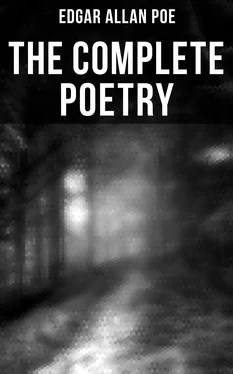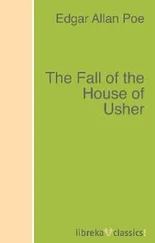Threshold of the wide-open gate of dreams,
Gazing, entranced, adown the gorgeous vista,
And thrilling as I see, upon the right,
Upon the left, and all the way along,
Amid empurpled vapors, far away
To where the prospect terminates— thee only!
Table of Contents
Lo! Death has reared himself a throne
In a strange city lying alone
Far down within the dim West,
Where the good and the bad and the worst and the best
Have gone to their eternal rest.
There shrines and palaces and towers
(Time-eaten towers and tremble not!)
Resemble nothing that is ours.
Around, by lifting winds forgot,
Resignedly beneath the sky
The melancholy waters lie.
No rays from the holy Heaven come down
On the long night-time of that town;
But light from out the lurid sea
Streams up the turrets silently—
Gleams up the pinnacles far and free—
Up domes—up spires—up kingly halls—
Up fanes—up Babylon-like walls—
Up shadowy long-forgotten bowers
Of sculptured ivy and stone flowers—
Up many and many a marvellous shrine
Whose wreathed friezes intertwine
The viol, the violet, and the vine.
Resignedly beneath the sky
The melancholy waters lie.
So blend the turrets and shadows there
That all seem pendulous in air,
While from a proud tower in the town
Death looks gigantically down.
There open fanes and gaping graves
Yawn level with the luminous waves;
But not the riches there that lie
In each idol's diamond eye—
Not the gaily-jewelled dead
Tempt the waters from their bed;
For no ripples curl, alas!
Along that wilderness of glass—
No swellings tell that winds may be
Upon some far-off happier sea—
No heavings hint that winds have been
On seas less hideously serene.
But lo, a stir is in the air!
The wave—there is a movement there!
As if the towers had thrust aside,
In slightly sinking, the dull tide—
As if their tops had feebly given
A void within the filmy Heaven.
The waves have now a redder glow—
The hours are breathing faint and low—
And when, amid no earthly moans,
Down, down that town shall settle hence,
Hell, rising from a thousand thrones,
Shall do it reverence.
Table of Contents
At midnight, in the month of June,
I stand beneath the mystic moon.
An opiate vapor, dewy, dim,
Exhales from out her golden rim,
And, softly dripping, drop by drop,
Upon the quiet mountain top,
Steals drowsily and musically
Into the universal valley.
The rosemary nods upon the grave;
The lily lolls upon the wave;
Wrapping the fog about its breast,
The ruin moulders into rest;
Looking like Lethe, see! the lake
A conscious slumber seems to take,
And would not, for the world, awake.
All Beauty sleeps!—and lo! where lies
(Her casement open to the skies)
Irene, with her Destinies!
Oh, lady bright! can it be right—
This window open to the night!
The wanton airs, from the tree-top,
Laughingly through the lattice-drop—
The bodiless airs, a wizard rout,
Flit through thy chamber in and out,
And wave the curtain canopy
So fitfully—so fearfully—
Above the closed and fringed lid
'Neath which thy slumb'ring soul lies hid,
That, o'er the floor and down the wall,
Like ghosts the shadows rise and fall!
Oh, lady dear, hast thou no fear?
Why and what art thou dreaming here?
Sure thou art come o'er far-off seas,
A wonder to these garden trees!
Strange is thy pallor! strange thy dress!
Strange, above all, thy length of tress,
And this all-solemn silentness!
The lady sleeps! Oh, may her sleep
Which is enduring, so be deep!
Heaven have her in its sacred keep!
This chamber changed for one more holy,
This bed for one more melancholy,
I pray to God that she may lie
For ever with unopened eye,
While the dim sheeted ghosts go by!
My love, she sleeps! Oh, may her sleep,
As it is lasting, so be deep;
Soft may the worms about her creep!
Far in the forest, dim and old,
For her may some tall vault unfold—
Some vault that oft hath flung its black
And winged panels fluttering back,
Triumphant, o'er the crested palls,
Of her grand family funerals—
Some sepulchre, remote, alone,
Against whose portal she hath thrown,
In childhood many an idle stone—
Some tomb from out whose sounding door
She ne'er shall force an echo more,
Thrilling to think, poor child of sin!
It was the dead who groaned within.
Table of Contents
The ring is on my hand,
And the wreath is on my brow;
Satins and jewels grand
Are all at my command.
And I am happy now.
And my lord he loves me well;
But, when first he breathed his vow,
I felt my bosom swell—
For the words rang as a knell,
And the voice seemed his who fell In the battle down the dell, And who is happy now. But he spoke to reassure me, And he kissed my pallid brow, While a reverie came o'er me, And to the churchyard bore me, And I sighed to him before me, Thinking him dead D'Elormie, "Oh, I am happy now!" And thus the words were spoken, And thus the plighted vow, And, though my faith be broken, And, though my heart be broken, Behold the golden keys That proves me happy now! Would to God I could awaken For I dream I know not how, And my soul is sorely shaken Lest an evil step be taken,— Lest the dead who is forsaken May not be happy now.
Table of Contents
"The Raven" was first published on the 29th January, 1845, in the New York Evening Mirror —a paper its author was then assistant editor of. It was prefaced by the following words, understood to have been written by N. P. Willis:
"We are permitted to copy (in advance of publication) from the second number of the American Review , the following remarkable poem by Edgar Poe. In our opinion, it is the most effective single example of 'fugitive poetry' ever published in this country, and unsurpassed in English poetry for subtle conception, masterly ingenuity of versification, and consistent sustaining of imaginative lift and 'pokerishness.' It is one of those 'dainties bred in a book' which we feed on. It will stick to the memory of everybody who reads it."
In the February number of the American Review the poem was published as by "Quarles," and it was introduced by the following note, evidently suggested if not written by Poe himself.
"The following lines from a correspondent—besides the deep, quaint strain of the sentiment, and the curious introduction of some ludicrous touches amidst the serious and impressive, as was doubtless intended by the author—appears to us one of the most felicitous specimens of unique rhyming which has for some time met our eye. The resources of English rhythm for varieties of melody, measure, and sound, producing corresponding diversities of effect, have been thoroughly studied, much more perceived, by very few poets in the language. While the classic tongues, especially the Greek, possess, by power of accent, several advantages for versification over our own, chiefly through greater abundance of spondaic feet, we have other and very great advantages of sound by the modern usage of rhyme. Alliteration is nearly the only effect of that kind which the ancients had in common with us. It will be seen that much of the melody of 'The Raven' arises from alliteration and the studious use of similar sounds in unusual places. In regard to its measure, it may be noted that if all the verses were like the second, they might properly be placed merely in short lines, producing a not uncommon form: but the presence in all the others of one line—mostly the second in the verse" (stanza?)—"which flows continuously, with only an aspirate pause in the middle, like that before the short line in the Sapphio Adonic, while the fifth has at the middle pause no similarity of sound with any part beside, gives the versification an entirely different effect. We could wish the capacities of our noble language in prosody were better understood."
Читать дальше












